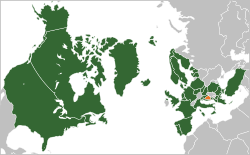 | |
NATO | Bosnia and Herzegovina |
|---|---|
 |
|---|
The accession of Bosnia and Herzegovina to NATO (North Atlantic Treaty Organization) has been under negotiations since 2008.
 | |
NATO | Bosnia and Herzegovina |
|---|---|
 |
|---|
The accession of Bosnia and Herzegovina to NATO (North Atlantic Treaty Organization) has been under negotiations since 2008.
The 1995 NATO bombing of Bosnia and Herzegovina targeted the Bosnian Serb Army and together with international pressure led to the resolution of the Bosnian War and the signing of the Dayton Agreement in 1995. Since then, NATO has led the Implementation Force and Stabilization Force, and other peacekeeping efforts in the country.
Bosnia and Herzegovina joined the Partnership for Peace program of NATO in 2006, and signed an agreement on security cooperation in March 2007. [1] The nation began further cooperation with NATO under their Individual Partnership Action Plan in January 2008. [2] Bosnia then started the process of Intensified Dialogue at the 2008 Bucharest summit. [3] The country was invited to join the Adriatic Charter of NATO aspirants on 25 September 2008. [4] Then in November 2008, a joint announcement from the Defence Minister and the NATO Mission Office in Sarajevo suggested that Bosnia and Herzegovina could join NATO by 2011 if the defense reforms made until then were continued. [5]
In January 2009, Defence Minister Selmo Cikotić again confirmed Bosnia's interest in seeking a Membership Action Plan (MAP) at the 2009 summit, with membership by 2012 at the latest. [6] In February 2009 Defence Minister Selmo Cikotić presented poll numbers on NATO membership: 70% of the country supports NATO membership; however while 89% of the Federation Entity supports NATO membership, only 44% in the RS Entity did. [7] While the country did not receive a MAP at the April 2009 summit in Strasbourg–Kehl, Stuart Jones, an official of the US State Department, said on a September 2009 visit to Bosnia and Herzegovina that NATO was going to look at the possibilities for them to receive one in a December 2009 summit, repeating strong US support for the possibility. Then on 2 October 2009, Haris Silajdžić, the Bosniak Member of the Presidency, announced an official application for a MAP. On 22 April 2010, NATO agreed to launch the MAP for Bosnia and Herzegovina, but with certain conditions. [8] Turkey is thought to be the biggest supporter of Bosnian membership. [9]
Bosnia and Herzegovina has yet to fulfil the condition to launch an Annual National Programme under its MAP: the transfer of the registration of 63 military facilities from the local level to the central government. [10] [11] As of November 2018, 33 have been fully transferred, all of which are located in the Federation of Bosnia and Herzegovina. [12] [13] The Republika Srpska (RS), the Serbian political subdivision of Bosnia, opposes the move and refuses to transfer the 23 properties located in its territory. A Bosnian court has ruled that it must transfer the military facility in Han Pijesak in RS to the Bosnian government. [14] This was upheld by a ruling of the Constitutional Court of Bosnia and Herzegovina on 16 August 2017. [15]
Despite the fact that all immovable property is not fully registered, NATO approved the activation of the Membership Action Plan for Bosnia and Herzegovina, and called on Bosnia to submit an Annual National Program on 5 December 2018. [16] On 17 December, United States Deputy Secretary of State John Sullivan stated the United States supports Bosnia and Herzegovina's bid to join NATO, and dismissed Serb objections by adding that "Washington would react strongly to any threat to the stability of the country". [17] The submission of a MAP Annual National Program was delayed due to a veto by Milorad Dodik, the Serb member of the Bosnian Presidency. [18] The issue also prevented the formation of a government following the 2018 Bosnian general election. [19] On 19 November 2019, as part of a broader deal on government formation, Dodik agreed to a Reform Program which would be sent to Brussels. [20] However, there is disagreement on whether this Reform Program is actually an Annual National Program under NATO. [21]
| Event | Date |
|---|---|
| Partnership for Peace | 14 December 2006 [22] |
| Individual Partnership Action Plan | 10 September 2008 [23] [24] |
| Intensified Dialogue | 3 April 2008 [25] |
| Membership Action Plan | 5 December 2018 [26] [Note 1] |

Mirko Šarović is a Bosnian Serb politician who served as the 3rd Serb member of the Presidency of Bosnia and Herzegovina from 2002 to 2003. From 2000 to 2002, he also served as the 4th president of Republika Srpska and was Minister of Foreign Trade and Economic Relations on two occasions as well.

Milorad Dodik is a Bosnian Serb politician currently serving as the 8th president of Republika Srpska since 2022, a position he previously held from 2010 to 2018. He also served as the 7th Serb member of the Presidency of Bosnia and Herzegovina from 2018 to 2022.

Individual Partnership Action Plans (IPAP) are plans developed between NATO and different countries which outline the objectives and the communication framework for dialogue and cooperation between both parties. NATO launched the IPAPs initiative at the 2002 Prague Summit.
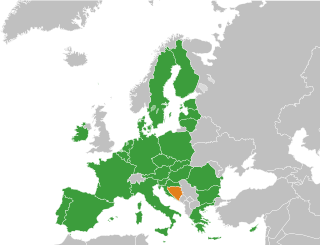
The accession of Bosnia and Herzegovina to the European Union (EU) is the stated aim of the present relations between the two entities. Bosnia and Herzegovina has been recognised by the European Union as a "candidate country" for accession since the decision of the European Council in 2022 and is on the current agenda for future enlargement of the EU. Bosnia and Herzegovina takes part in the Stabilisation and Association Process and trade relations are regulated by an Interim Agreement.

Miroslav Lajčák is a Slovak politician and diplomat, former Minister of Foreign Affairs of the Slovak Republic. In addition, Lajčák also served as President of the United Nations General Assembly for the 72nd session from 2017 until 2018.

Bisera Turković is a Bosnian diplomat and politician who served as Minister of Foreign Affairs from 2019 to 2023. She was the first female foreign minister of Bosnia and Herzegovina.

The mass media of Bosnia and Herzegovina refers to mass media outlets based in Bosnia and Herzegovina (BiH). Television, radio, magazines and newspapers are all operated by both state-owned and for-profit corporations which depend on advertising, subscription, and other sales-related revenues. The Constitution of Bosnia and Herzegovina guarantees freedom of speech, although political and business pressures - coupled with administrative fragmentation - still hinder the independence of journalists and media outlets.
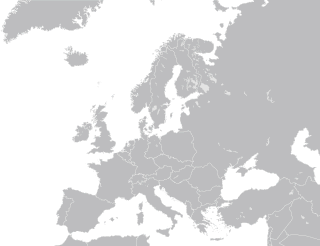
NATO is a military alliance of thirty-two European and North American countries that constitutes a system of collective defense. The process of joining the alliance is governed by Article 10 of the North Atlantic Treaty, which allows for the invitation of "other European States" only and by subsequent agreements. Countries wishing to join must meet certain requirements and complete a multi-step process involving political dialogue and military integration. The accession process is overseen by the North Atlantic Council, NATO's governing body. NATO was formed in 1949 with twelve founding members and has added new members ten times. The first additions were Greece and Turkey in 1952. In May 1955, West Germany joined NATO, which was one of the conditions agreed to as part of the end of the country's occupation by France, the United Kingdom, and the United States, prompting the Soviet Union to form its own collective security alliance later that month. Following the end of the Franco regime, newly democratic Spain chose to join NATO in 1982.

Selmo Cikotić is a Bosnian politician who served as Minister of Security from 2020 to 2023. He was also the Minister of Defence from 2007 to 2012. He is a member of the Party of Democratic Action.

The accession of Albania to NATO took place in 2009. Albania's relationship with the North Atlantic Treaty Organization (NATO) began in 1992 when it joined the North Atlantic Cooperation Council. In 1994, it entered NATO's Partnership for Peace, which began Albania's process of accession into the alliance. In 1999, the country received a Membership Action Plan (MAP). The country received an invitation to join at the 2008 Bucharest Summit and became a full member on April 1, 2009.

General elections were held in Bosnia and Herzegovina on 3 October 2010. They decided the makeup of Bosnia and Herzegovina's Presidency as well as national, entity, and cantonal governments.

Željka Cvijanović is a Bosnian Serb politician serving as the 8th and current Serb member of the Presidency of Bosnia and Herzegovina since 2022. She previously served as the 9th president of Republika Srpska from 2018 to 2022.
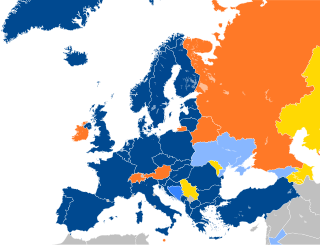
NATO maintains foreign relations with many non-member countries across the globe. NATO runs a number of programs which provide a framework for the partnerships between itself and these non-member nations, typically based on that country's location. These include the Euro-Atlantic Partnership Council and the Partnership for Peace.

The Dayton Agreement ended the Bosnian War and created the federal republic of Bosnia and Herzegovina (BiH), which consists of the Bosniak and Croat-inhabited Federation of Bosnia and Herzegovina (FBiH) and the Serb-inhabited Republika Srpska (RS). Although the Bosnian Serbs were viewed as "anti-Dayton" during the first years after the war, since 2000 they have been staunch supporters of the Dayton Agreement and the preservation of RS. Bosniaks generally view RS as illegitimate, and an independence referendum from BiH has been proposed in RS. The 2006 Montenegrin independence referendum and Kosovo's 2008 declaration of independence have raised the possibility of a referendum and unification with Serbia. In 2015, after a judicial and police crisis, the governing Alliance of Independent Social Democrats said that it would hold an independence referendum in 2018 if RS's autonomy was not preserved. Almost all people vote for pro-independence parties.

Šefik Džaferović is a Bosnian politician who served as the 7th Bosniak member of the Presidency of Bosnia and Herzegovina from 2018 to 2022. He has been serving as member of the national House of Peoples since 2023. A high ranking member of the Party of Democratic Action, he was formerly its vice president and general secretary.

Vladan Kovačević is a Bosnian professional footballer who plays as a goalkeeper for Portuguese club Sporting CP.

Zoran Tegeltija is a Bosnian Serb politician serving as director of the Indirect Taxation Authority of Bosnia and Herzegovina (ITA) since June 2023. He previously served as Minister of Finance and Treasury from January to June 2023. He also served as Chairman of the Council of Ministers of Bosnia and Herzegovina from 2019 to 2023.

General elections were held in Bosnia and Herzegovina on 2 October 2022. They decided the makeup of the presidency as well as national, entity and cantonal governments.

The Thirteenth Council of Ministers of Bosnia and Herzegovina was the Council of Ministers of Bosnia and Herzegovina cabinet formed on 23 December 2019, following the 2018 general election. It was led by Chairman of the Council of Ministers Zoran Tegeltija. The cabinet was dissolved on 25 January 2023 and was succeeded by a new Council of Ministers presided over by Borjana Krišto.
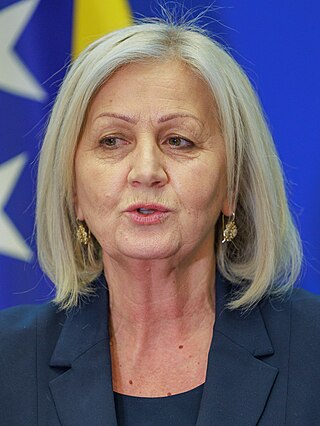
The Fourteenth Council of Ministers of Bosnia and Herzegovina is the current Council of Ministers of Bosnia and Herzegovina cabinet formed on 25 January 2023, following the 2022 general election. It is led by Chairwoman of the Council of Ministers Borjana Krišto.